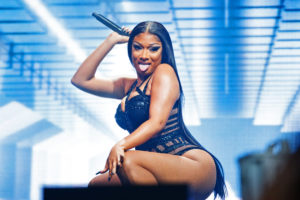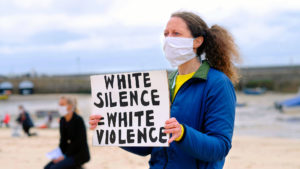Beyoncé named her most recent album after the golden age of creative expression, the era that gave us the greatest art the world has ever seen. Renaissance was supposed to usher in another moment of wild, unbridled innovation. The album was “a place to be free of perfectionism and overthinking. A place to scream, release, feel freedom,” the singer wrote in a letter to fans accompanying the new work. But unlike its namesake, which endured for 200 years and reshaped society, Beyoncé’s Renaissance only lasted a day or two, before the internet’s culture cops stepped in to shut it down.
It all started with “Heated”, a song in which Beyoncé raps about “spazzing on that ass”. Disability activists zeroed in on the verb, which is having a bit of a moment in American pop. Last month, Lizzo came under fire for using it in one of her songs; she altered the offending lyric. When the Australian woman who spearheaded the campaign against Lizzo was asked if she planned to make similar demands of Beyoncé, she answered the question with an op-ed in the Guardian: “When Beyoncé dropped the same ableist slur as Lizzo on her new album, my heart sank.”
This controversy was somewhat mystifying to audiences in America — where both Beyoncé and Lizzo were born and raised. The word spaz has different implications in American English — particularly African American Vernacular English, or AAVE — from the one it has in the UK or, it seems, Australia. In the US, it’s not uncommon to hear people use “spazzing out” to mean going crazy or malfunctioning; the idea that it could be a slur was met with bewilderment by American audiences. And in Lizzo’s song, “Imma spaz” is a warning: she’s about to go nuts. (The whole song, which is about getting in fights, eventually escalates to more specific details about what “spazzing”, as a verb, might entail: “I’ma go Lorena Bobbitt on him, so he never fuck again.”)
The battle over the word has also thoroughly upended the usual deference paid by progressive culture warriors to black women, particularly when it comes to the use of AAVE. The optics of a white Australian coming after Lizzo and Beyoncé, insisting that the black American cultural context for the word “spaz” is superseded by her own, are deeply weird. Lizzo hints at this injustice in her statement about changing her lyrics: “As a fat black woman in America, I’ve had many hurtful words used against me.” The subtext is clear: you may have successfully painted yourself as a victim this time, white lady, but we all know that this isn’t usually how oppression works.
These linguistic misunderstandings are a hazard of global culture in which the same word may have different meanings depending on where you are, or what language you’re speaking. For example, the periodic public freakouts by parents who have just noticed that one of their child’s Crayola crayons has the word “negro” on it. They are invariably followed by the Crayola corporation explaining patiently, for the millionth time, that all the crayons include colour translations for Spanish-speaking children and “negro” is the Spanish word for black.
You might think that Beyoncé — a woman who wrote a song called “Sorry” in which she refuses to apologise for doing what she wants; a woman who has never shied away from making art that is steeped in black American culture; a descendant of slaves who was one of the most powerful and wealthy entertainers in the world by the time she turned 40 — would have at least as much gumption as the children’s crayon company when it comes to defending her work.
Instead, she capitulated instantly.
The lyrics in “Heated” will be altered, per a statement by Beyoncé’s team. Per a recent Spotify listen, they already have been: the new iteration not-quite-seamlessly replaces “spazzing” with “blasting”. Beyoncé herself hasn’t spoken about the decision, but it’s a fair bet that Lizzo, who is already encroaching on Bey’s status as an icon not just of pop culture but of politically conscious art, had pretty much greased the skids on this one. Beyoncé’s choices were to follow her lead or look like an insensitive clod by comparison.
And as a woman who is both famously protective of her privacy as well as notoriously control-freaky about her public image — up to and including trying to get unflattering photos of herself removed from the internet — the move is hardly surprising. Naturally Bey would prefer to avoid finding herself at the centre of a cancel-culture maelstrom which is personally intrusive, professionally disruptive, and threatens to overshadow the release of the album she spent two years working on.
That artists can now instantly edit songs because a few hundred people became outraged by the lyrics on social media is, of course, a recent thing, made possible only by the advent of streaming — and maybe one day there will be a black market for bootleg recordings of the “dirty” version of “Heated”, just as my childhood VHS copy of The Little Mermaid became a collector’s item after Disney edited out the now-notorious scene in which the priest officiating Prince Eric’s wedding appears to be sporting an erection. (The official Disney line, which absolutely nobody believes, is that it’s a poorly-drawn knee.) But even as the malleability of digital media means that we can retroactively edit out anything, anytime, for any reason, it’s hard to overstate how bad it is for art if the consensus becomes that we should.
The mistaken identity aspect of this particular controversy — the fact that activists insisted on ignoring the unique cultural context of “spaz” in order to take offence — certainly adds an extra layer of absurdity to the whole enterprise. (Imagine a group of American social justice warriors bewailing the horror of every scene in British cinema where someone asks for a cigarette using a certain f-word.) Additionally ridiculous is the part where Beyoncé is black, and writing in a racially-inflected dialect, which under any other circumstances would command absolute deference from the white progressives who are now demanding she alter her art to suit them. But the fact that it’s easy to make fun of this controversy also obscures what makes it toxic: a callow betrayal of the ideals and the legacy that have made American culture into a global force.
The US has always been a place where artists insist on their absolute freedom to create work that is provocative and daring and, yes, even offensive, and even objectively so. American music is Jim Morrison singing “girl we couldn’t get much higher” on the Ed Sullivan Show after being explicitly told not to, and laughing it off when an enraged Sullivan confronted him after the set. It’s Frank Zappa calling Tipper Gore and Susan Baker “the wives of Big Brother” during the Senate’s “Rock Porn” hearings, and railing against proposed legislation that “reads like an instruction manual for some sinister kind of toilet-training programme to house-break all composers and performers because of the lyrics of a few”. It’s Smack My Bitch Up, and Fuck the Police, and Papa Don’t Preach, and W.A.P. And as a culture, we have always fiercely defended the right of artists to engage in irreverence, heresy, and obscenity, understanding that these freedoms are necessary to the creation of fearless work.
Meanwhile, the pressure to change a work of art to be more sensitive falls disproportionately on women, who are, for some reason, expected to be receptive to such demands. A list of musicians whose “offensive” lyrics were changed not only skews heavily female but shows the comparatively high bar a man’s song has to clear to be subject to the same sort of backlash; consider the nature of, say, Taylor Swift’s offence (“So go and tell all your friends that I’m obsessive and crazy / That’s fine, I’ll tell mine / You’re gay, by the way”) versus Michael Jackson’s (“Kill me, kike me, don’t you black or white me”.) The double standard surrounding the lyrical depiction of women, and women’s bodies, is so wild that Meghan Trainor was savaged for not being body positive enough in her 2014 song “All About That Bass” — the same year that Drake, on Nicki Minaj’s Pinkprint album, received no criticism at all for announcing his predilection for Rubenesque women who “wanna suck you dry and then eat some lunch with you”.
But women’s contributions to the culture are less valuable, their work assumed to be eternally open to revision in a way that makes it less serious than men’s. What gives us the idea that if it’s a woman, we may not just demand but expect apologies for how she uses language in her lyrics? What are we to conclude when the most powerful female musician in the world is expected to compromise her artistic integrity lest she hurt somebody’s feelings?
Meanwhile, the conversation surrounding this new album has swiftly come to resemble that cautionary fable about giving a mouse a cookie. A second alteration to Renaissance has also been announced — this one the removal of a sample of the 2003 song “Milkshake,” after singer Kelis complained on Instagram that the song had been stolen. (The two men who actually wrote the song had been credited — as had Kelis, for performing it.) At the same time, Monica Lewinsky suggested on Twitter that while Beyoncé is making changes, perhaps she should also remove a reference to Lewinsky’s affair with then-President Bill Clinton from her 2013 song “Partition”. And why not? “Partition” explicitly makes light of one of the most humiliating moments in Lewinsky’s life; surely she has just as much (if not more!) claim to righteous offence as the activists who cannot recognise that the word “spaz” might mean different things in different contexts (although this argument may be somewhat undermined by the fact that Lewinsky still proudly includes “rap song muse” in her Twitter bio).
Having signalled that she’s willing to edit her work to avoid giving offence, Beyoncé can expect every single song she releases from this moment forward to be scrutinised. And perhaps more importantly, so can everyone else. Beyoncé and Lizzo have kicked this door open; there’s no telling how many other artists will be expected to walk through it.
And Beyoncé’s Renaissance, far from being a transformative and unfettered explosion of pure expression — a work that allowed the performer, during the pandemic, “to feel free and adventurous in a time when little else was moving” — has been marked out as a place where creative freedom lost ground, and where the censors won. This moment has been stolen by self-appointed culture cops who neither understand nor appreciate what they’re tearing down, and who are drunk not on the power of the music, but on the petty power trip of successfully blackmailing a famous, gifted musician into changing her art because they said so.
Disclaimer
Some of the posts we share are controversial and we do not necessarily agree with them in the whole extend. Sometimes we agree with the content or part of it but we do not agree with the narration or language. Nevertheless we find them somehow interesting, valuable and/or informative or we share them, because we strongly believe in freedom of speech, free press and journalism. We strongly encourage you to have a critical approach to all the content, do your own research and analysis to build your own opinion.
We would be glad to have your feedback.
Source: UnHerd Read the original article here: https://unherd.com/





